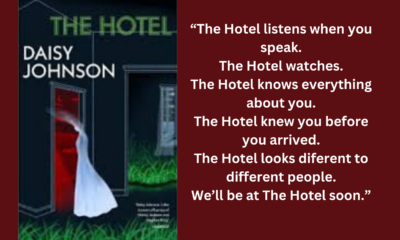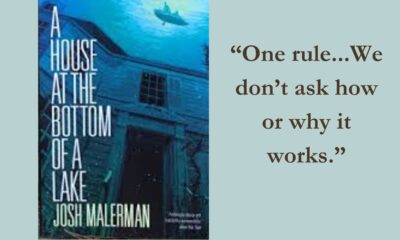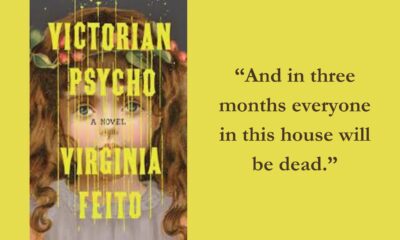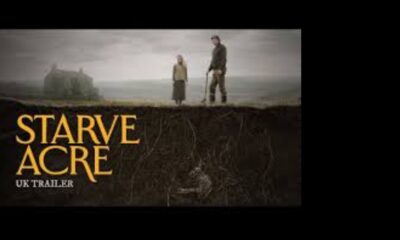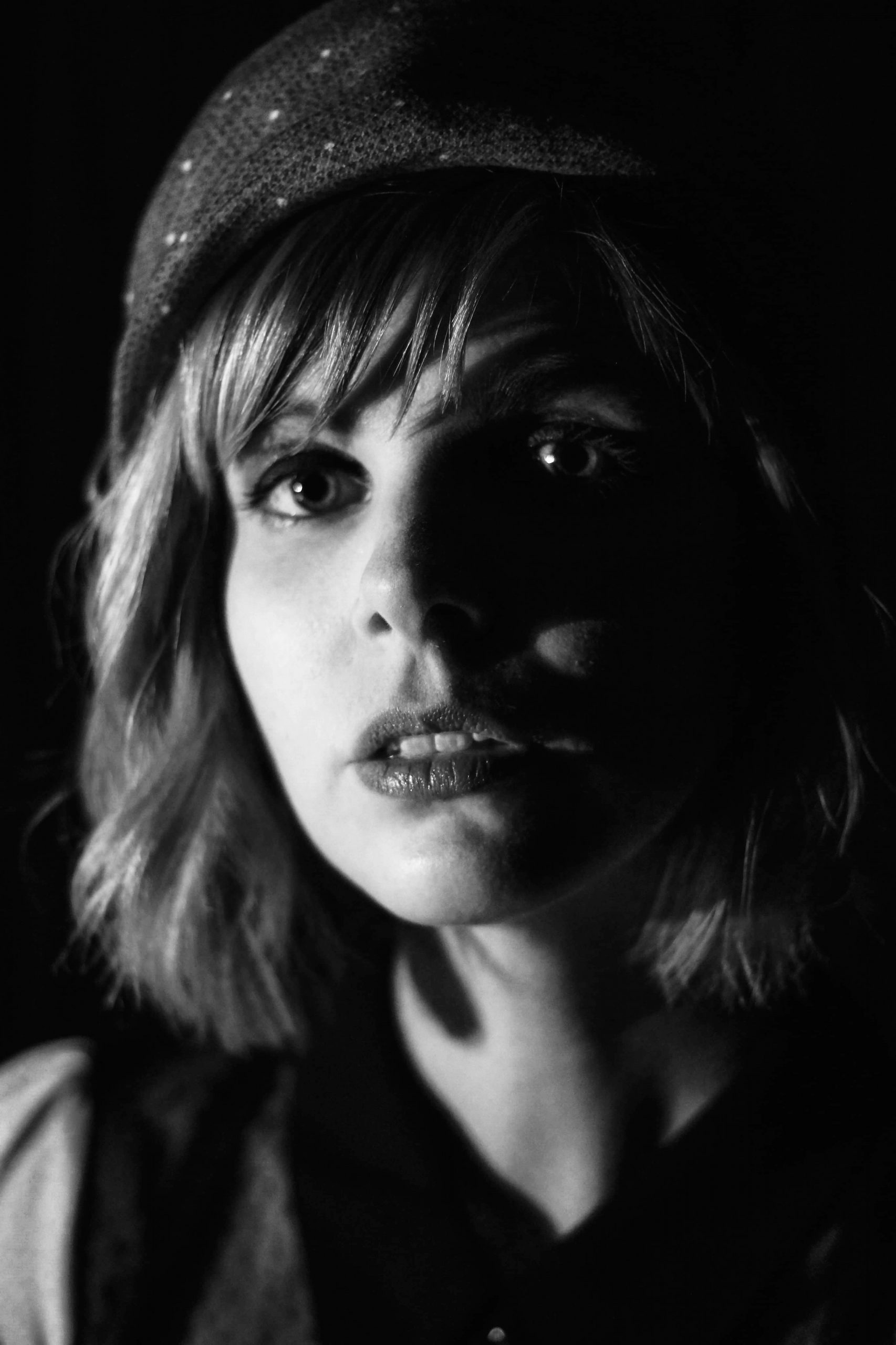
Haunted MTL Original – BENT – Ariadne Blayde
More Videos
Published
4 years agoon
By
Shane M.“BENT” by Ariadne Blayde
Kate gazed out the window as they rattled away from the town square of Cluj-Napoca, the unofficial capital of Transylvania, in Andrei’s creaky old rectangle of a Peugeot. It was dusk. The last weak warmth of the sun’s rays on her cheek disappeared when she turned to look at Andrei.
“So tell me more about this mysterious forest,” she said to his profile. His jaw was the same shape as Marius’, his big hands heavy on the steering wheel. They were rough and calloused from a lifetime of working outdoors. She remembered their feel well.
“Well. Again, I don’t know for certain, because I haven’t been there myself. But they say it is named for a shepherd who went into the forest with a flock of 200 sheep and never came out.”
“Wait, why would you take sheep into a forest?”
“I don’t know,” Andrei said with a playful grin. “Maybe if we find him, we can ask him.”
“What do you mean, find him?”
“Well, that is the other thing. They say people lose time in the forest. I heard that a little girl wandered in, went missing, and turned up five years later without having aged at all. Wearing the same clothes, even.”
Kate rolled her eyes. “Oh stop.”
“And the trees? Supposedly they grow at strange angles. All bent and twisted. And there’s one clearing, a perfect circle area, where nothing grows at all, not even mushrooms. They say it’s full of ghosts.” Then he shrugged. “If you believe in that sort of thing.”
Andrei had only lived in Cluj for six months or so. He’d moved here after it happened — presumably to get away from his father, though she hadn’t asked. The rest of Kate’s trip had been to Alba Iulia, to tie up some loose ends with Marius’ business, and to the village outside it to visit his other family. She was only in Cluj because the airport was. She’d told herself she wouldn’t see Andrei. But here they were, absurdly, on their way to go hiking at night. He’d suggested it, and she’d agreed. Dinner and drinks would have been out of the question.
“They say you hear things, and see things,” he continued. “Voices with no bodies. Green eyes in the dark. And they say you will feel something, too. The feeling of being watched. Many become sick, or very lonely, or afraid.”
She raised her eyebrows and he turned briefly to look at her, then laughed.
“Eh, don’t worry. It is probably only old wives’ tales.”
“So who’s this ‘they,’ anyway?” she asked.
“What do you mean?”
“‘They say.’ Where’d you hear these stories?”
“Aah… well.”
“From him?”
“When we were boys.”
The sun was setting fast, the last blood-orange clouds beginning to darken in the sky. Soon she and Andrei would just be silhouettes.
Maybe the last time she’d be in Romania. Flight to LAX in ten hours.
Within minutes they were out of the city, turning down increasingly narrow country roads as the sun dipped below the horizon. At its center Cluj felt like any other European capital, but after just a few minutes of driving, the rows of squat, Communist-built apartment buildings faded into the sparse poverty of rural Romania. Dim, stooped human shapes moving around thatch-roofed huts served as an abrupt reminder that despite Marius and his luxury real estate development, Romania still was not a first-world country.
The darkness came quickly. Kate watched it settle in.
Andrei was now hunched forward in the drivers’ seat, following a worn-out map that he’d fished from the glovebox and pinned to the steering wheel with one hand. He frowned at it. “I think this is incorrect.”
“What?”
“The way the road splits, here. It is not on the map.”
“So, which way do we go?”
“I think maybe to the left.”
He turned down a gravel road, the beams of the headlights weak in the dark.
“Are you sure? This doesn’t seem like a well-traveled, um, thoroughfare.” It seemed quieter now, somehow, and Kate realized that the dusky chirping of the summer crickets in the fields had faded. The only sound now was the crunch of the gravel under the car’s tires.
“Andrei?”
“I think we are here.”
“What?”
“The forest. I think we are in it, now.”
Sure enough, Kate realized, her view of huts and fields had been replaced by a thick tangle of underbrush. They were going slowly uphill.
“So where are we going? Is there, like, a trail?”
“Well. The problem is, the forest is very large. It is on the map, but I’m not sure which part is, you know, so haunted.”
“So you don’t know where we’re going.” Like his brother, Andrei hated to admit when he’d made a mistake.
“I was thinking, maybe this would take us to a place to park, or…” He trailed off as the gravel gave way to dirt. The road seemed narrower than before.
“Doesn’t look like it. Maybe we should turn around?”
Suddenly the tires were spinning helplessly and the car was not moving forward anymore. “What the hell?” Andrei muttered. He looked out the window. “Mud.”
“Shit, really?”
“Although, I don’t know why there is mud. It has not rained here for weeks.” He stepped on the gas again. The car made an ugly sound and didn’t move.
“So now what,” she said.
“Maybe we can just get out here? Have a look quickly?”
“But there’s not a trail.”
“Well, we can just walk up the road. That way it will be easy to find the car when we’re finished.”
“Okay. Sure.”
Kate stepped out of the car into three inches of mud.
“Shit!”
“What is it?”
“This fucking mud is no joke.”
“Should we not do this, maybe?”
“I mean, might as well.” She did her best to pull herself out of the mud, annoyed, and wiped some from her shoe onto the car tire.
“Futa-l dracu!” Andrei swore as he closed his car door, smacking himself in the forehead with his palm. “Another problem. We have no light.”
“It’s not too dark, though,” she said, glancing up at the sky. The rising moon was nearly full, bathing the woods in soft white light. “I bet we’ll be okay without one.”
“If you say so,” he shrugged. They started walking.
The thick mud hardened as they went along, and after twenty or thirty yards, the road turned, narrowed, and the car disappeared from view. Andrei’s fingers accidentally brushed Kate’s as they walked, and the sensation felt electric. It was the first time they’d touched all night. “Sorry,” he said immediately. But she looked at him absentmindedly, as though she hadn’t noticed.
“Sorry for what?”
“Nothing.”
Had she really not registered his touch? That’s how it had started, after all, their hands brushing together that night in Alba Iulia as they’d left the restaurant after a dinner Marius had paid for but not joined. Here’s 300, he’d said in that cold, modern hotel room above the warm medieval city, tossing a bill clip at Andrei. Buy her a nice meal, keep her company. I have too much work tonight. He’d never suspected, of course. Andrei was a nobody, just his loser decretel brother.
He glanced over at Kate. It had been only eight months, but she looked different, with this severe new haircut and the lost weight. She’d been so soft before.
“Doesn’t look that weird to me,” she said, looking around at the trees. “Didn’t you say the trees were supposed to be all bent and funny shaped?”
She was right, the trees seemed very normal. They were just trees, not so strange or special, not so close together or widely spaced. Straight and tall, just trees in the dark.
“Well, perhaps it is in another part of the forest that they look different,” he said.
“Hmm.”
She seemed disappointed, and Andrei felt his cheeks go hot with frustration. Certainly after just a few minutes they would agree there was nothing to see, go back to the car, and shortly afterward part ways. Tomorrow she would go back to America.
“I’m sorry,” he said.
“It’s nice though,” she shrugged. “The moon is pretty.”
He looked up between overhanging branches and caught sight of it, a fat white light in the sky. So what, he thought. “Do they not have the moon in America?” he said darkly.
“Wow, sarcasm! That’s new, coming from you,” she said, and laughed.
Andrei felt pleased that he’d made a joke she liked. He remembered sitting up late in the kitchen with Marius and his father at their childhood home, the very first time Marius had brought Kate to visit. “These American girls,” Marius had said. “They like smart guys. They like rich guys. But mostly, they like funny guys.” Andrei remembered that week ringing with the sound of Kate’s laughter, her voice warm and clear and different. But he couldn’t follow the jokes his brother made, all in American slang that Andrei didn’t understand.
“You see, Andrei?” their father had said, taking a drag from his cigarette. “If you were clever like this, had learned English better and studied harder, you could have gone to America and gotten a pretty girl like that.”
“Dad, please, the smoke,” Marius said with a sour look, and their father obediently put out the cigarette. “Really, it’s so backward. In the civilized world, people don’t smoke inside like this.”
“And what is so civilized about America?” Andrei remembered grumbling. “I see the news, they’re always killing each other with guns. And everyone there is fat.”
“You’re one to talk,” Marius laughed, poking at Andrei’s stomach. Andrei had stood then, angry, and walked out of the kitchen. “Relax, Romanian girls like a little meat on the bone!” Marius had called after him. The reality was that Andrei could never get rid of his slight belly, could never have the physique his brother did, because their father had forced him to work in the family junkyard as a boy and all the heavy lifting had caused a hernia. So now and for the rest of his life, if he worked out too hard, his guts would spill out.
Decretel, a child of the decree, the unwanted second son. Ceaucescu had desired a bigger population, more laborers for his factories, so, no more abortion. No contraceptives, even. “Anti-bebe! Anti-bebe!” the Roma women called outside the resorts by the Black Sea, holding up packets of pills. “Bought some of those for your mother when you showed up in her belly,” his father had winked at Andrei the one time he’d taken the boys to the seashore. Then he’d frowned. “Gypsy trash. Didn’t work, did it?”
As he stormed down the hall away from their laughter, Kate had peeked out from the boys’ childhood bedroom, bare-legged under one of his t-shirts. Her eyes had been sleepy and calm and Andrei had instantly become embarrassed.
“Apology,” he’d said in his then-limited English. “We are very loud?”
“No, it’s okay. I like hearing him talk in Romanian. He insists on speaking English when we’re together.”
“You like Romanian?”
“Yes, it’s a beautiful language.” A romance language. Closer to Italian and French than Ukrainian or Polish.
“Well, then… Noapte buna si vise placute.”
“Does that mean good night?”
“Good night and… how do you say? Nice dreams.”
“Sweet dreams.”
“Thank you. And also to you.”
She’d laughed a little, and smiled, then gone back into the bedroom and closed the door. He’d felt pleased at having made her laugh, though he wasn’t sure what had been funny.
In the night he’d been awakened by the sound of his brother’s grunts and Kate’s high, clear sighs. The sound of it made an old familiar knot in his gut start to ache, the thing he told himself was just the hernia, but which spread quickly through his body with waves of green pain. He wished desperately that the sounds would stop, began to fantasize about kicking open the door and smothering Marius with a pillow, choking him, until the noise ended, but it didn’t, and soon the nausea was so intense that Andrei had to get up and stumble to the bathroom. Vomit poured out of him just as his brother’s grunting reached its crescendo. Maybe he’d had too much to drink.
The recollection made Andrei feel sick. Or maybe it was just the uphill path, irritating his hernia… a pulsing ache was materializing inside him.
“Are you okay?” Kate asked. “You’ve got a weird look.”
“I am fine.”
“You don’t look fine. You look like you’re in pain.”
The ache was spreading, blooming through his guts into crippling nausea. Andrei stopped, clutching his stomach, and Kate put a hand on his back. It felt heavy and strange. He pulled away.
“Just digestion, I think. I’ll be fine. Let’s continue walking.”
Kate had been lucky enough to grow up in the Bay Area, just a few hours from the most beautiful forests in America, where the redwoods were so large that twenty people couldn’t link arms around one trunk. The trees here were nondescript compared to the ones back home. They were all slender and straight, elm and beech and maple, maybe between forty and fifty years old. She was unimpressed.
“You said this forest has been around how long?”
“Fifty thousand years or some,” Andrei grunted.
“No way. The trees are way younger than that.”
He didn’t respond, and she glanced over at him. His face was still screwed up in discomfort.
“Are you sure you’re okay? Should we go back to the car?”
“No,” he said forcefully. “We should keep walking. At least to the top of the hill.” Kate was taken aback. Andrei’s softness, his mildness, had been why Kate had found herself curious in the first place.
“Look, I hate to say it, but I think the whole ‘haunted forest’ thing is a hoax,” she said.
“You’re right. Not so interesting, is it.”
“I mean, it’s nice to get outside, I guess.”
A metallic edge crept into Andrei’s voice. “I’m sure he took you to many better places, here in Romania.”
“Uh…”
“He took you to all the castles, yes? Dracula’s castle?”
“You mean Vlad the Impaler.”
“And you drank wine there. On the top of the ruins. A fine red wine, the color of blood.” Kate was surprised Marius had mentioned that to Andrei. They’d filled a water bottle with Merlot, sipped from it while looking down into the valley where Vlad had displayed his enemies on giant skewers.
“We thought it would be cute.”
“Did you toast?”
“I don’t remember.”
“But you remember the toast I taught you, yes?”
“How could I forget. Sanatate si virtute s-avem mereu ce fute.”
“You remember what it means?”
“I think so. May you have… health?” she began. “May you have health, may you have virtue, and may you always have someone to fuck.” Andrei grunted in the affirmative. There had been many nights that had begun with that toast, and ended with–
Kate shook the thought away. “He was mad that you taught me that, you know.”
“Of course he was. He was too — how do you say it.”
“Proper?”
“Stuck up. When you have American college, American money, American girl, I suppose that will make you too good to–”
“Andrei.”
“What?”
“You don’t have to compete with him anymore.”
They were silent.
Her eyes were fully adjusted to the night now, darkness softened by slices of moonlight and shadow. As they walked, not talking, Kate realized how quiet it was. Their footsteps barely made a sound, and there were no insects buzzing in the trees, no thrum of frog calls, not even the rustling of wind in the branches. Like being high up on a mountain above the treeline on a calm day. Except they weren’t above the treeline. An eerie feeling crept up her spine to her shoulders.
Kate hated quiet. As the only child of a loveless marriage, her childhood had been filled with a lifetime’s worth of silence. Probably one of the reasons she’d married Marius: he never stopped talking. Her husband had loved to show off his perfect English, his encyclopedic knowledge of finance, his wit. And he’d had so many words just for her. The most beautiful compliments, flowery and full of words that most native English-speakers didn’t use. He’d once called her beauty “incandescent.” Their love, he liked to say, was “incalculable and unconquerable.” Back when he’d been a graduate student, she’d snuck into the classes he taught just to hear him talk.
There had only been one time in their life together that he’d had nothing to say.
“It’s so quiet,” she said, to make it less so. Andrei didn’t respond. He’d always been much more careful with his words than Marius, didn’t speak unless necessary. Even after he became fluent, he was halting in his use of English, probably afraid that he’d slip up. Understandable for someone who’d been called stupid all his life. But still frustrating. Kate wanted to talk, to chatter, to fill the space with sound and words like Marius always had.
“Don’t you think it’s quiet?” she said again. The silence of the forest swallowed her words quickly, and again Andrei didn’t respond. As the seconds passed, the silence seemed to become even more intense, more oppressive. She felt leaves underfoot but her steps made no sound; the branches were moving but there was no rustling, no whisper of breeze. She wanted to shout, but her throat felt constricted. All she could hear was her own breath, growing more and more rapid.
Andrei grimaced, trying not to double over in discomfort. The nausea had gotten worse, and his entire body felt tingly and unsettled. He felt the need to vomit. He wondered how he could manage to do it without her noticing.
Suddenly Kate cried out his name, a little strangled sound from the back of her throat.
“What is it? What’s wrong?” He turned sharply to her, lay a hand on the soft skin of her arm. She was breathing heavily.
“Nothing. I just got freaked out for a second.”
He frowned. This was not turning out to be so fun. “We should go back, then. I do not want for you to be afraid.”
“You’re sweet.”
She’d called him that often. Since the first kiss. They’d been drinking palinca, the homemade apricot brandy that he always helped his father to make in the autumn, and she’d told him that he tasted sweet.
“It’s just the drink,” he’d said, his mouth inches from hers, the scent of fermented fruit lingering between them.
“Not just the drink. You. You’re sweet, and kind, and sensual.” Her fingers had been on his chest, then on his belly, which he sucked in self-consciously but not for long, because soon her fingers were sliding even lower, unbuckling his pants, tugging on him.
Her high, clear sighs that night seemed louder, more satisfied, than the ones he’d heard from Marius’ room during Kate’s first visit those many years before. And when it was over, he lay awake in the dark for an hour or more, smiling. It was the first time in his life he’d felt truly sated.
But as days stretched into weeks, the glow faded. One afternoon, as Marius made him a piece of toast with zacusca, something in Andrei wilted. “Remember when we were kids?” Marius had smiled, spooning the thick bell pepper spread onto the toast. “Whenever grandmother brought over a fresh batch of zacusca, we’d sneak into the kitchen at night and eat a whole loaf of bread with it.”
They’d been so poor, then, under Ceausescu. The zacusca was the most delicious thing they ever got to eat.
“And always got whipped for it the next day.”
“Yes,” Marius laughed. And then his face changed, and he put a hand on Andrei’s shoulder. “Always you worse than me, though, eh?”
Andrei turned away. “It doesn’t matter,” he said.
“But it does,” Marius said seriously.
Andrei waved him off. “It all evens out in the end.”
“You think?”
“Sure,” he’d said, glancing out the kitchen window at Kate in the yard. She was pinning laundry up, the hills and the junkyard and Andrei’s russet-colored Peugoet golden in the late afternoon light behind her. Russet: an English word she’d taught him, the color of roasted potatoes and autumn leaves. He tried to remember all the Romanian words he’d taught her, over the course of her visits. Femeie, Castelul, Inimă. Woman, castle, soul.
As a child, too, Andrei had taken things from his brother. Marbles, pencils, an American baseball card Marius had somehow gotten ahold of. Marius always got his things back, eventually. But he never tattled on Andrei.
Two days later he’d found them in bed. And two hours after that–
Andrei could no longer control it, the murky, unsettled feeling in his body, the need to vomit. He staggered off the path into the trees.
Kate’s head thudded with the sound of her own heartbeat. The silence seemed to be taking on more dimension, now, so that it was no longer an absence but a presence, radiating up from the ground and down from the sky and around from the trees. An angry, buzzing silence, the silence of Marius in the doorway. How long had he been there? She and Andrei had both called out as they’d disentangled, the three syllables of his name springing simultaneously from their lips and then disappearing into silence. Marius just looked at them. For an eternity he stood there, looking, his eyes cold, his lips closed. Nothing else was said.
It was almost as though she was wearing earplugs, now, dulling the sound of the outside world and augmenting the noises in her brain and body. She could feel her own pulse, the blood pumping through the rivers and streams of her veins, carrying with it the oxygen that kept her synapses firing, kept her feet moving forward up this hill. A closed system, circulating and re-circulating for as long as it could manage, keeping her alive, always moving forward.
Unless something happened to it. Unless the closed system became open. A hole. A crack. An opening for the blood to spill out of, rivers of veins diverted to a pooling lake, a red wet lake expanding useless from Marius’ head, spreading spreading spreading across the artificial landscape of a cool tile floor.
She and Andrei had gone to his hotel room together that evening, the evening he’d appeared silently in the doorway, after two hours had passed. The concierge knew them, sent them up to the suite with a wave and a smile. The door was ajar, the shower still running. The first thing Kate saw was his foot, bent strangely away from his ankle on the floor of the bathroom. Then a wet leg, a naked groin, a twisted torso. Something wrong above that. A mess of red. He’d slipped. Broken glass around him, the fifth of whiskey he’d almost finished off. How many of its molecules were there in the pool of blood on the floor, coagulated around the crack in his skull?
Andrei had been shouting in Romanian, loudly at first, then more quietly as the room went black. When Kate came to, the police were arriving and Andrei was at the window, staring out, perfectly still. Their father was there. He was the one shouting, now, cradling his dead son, blood on his pants, yelling and crying as the police pulled him away from the body. She was silent. Andrei kept looking and looking and looking out the window. After a minute he vomited. Just opened the window and threw up down onto the side of the hotel, this building her husband had made with all his money. She wanted to reach out to him.
But he was not there.
He was not beside her on the path, he was not behind her, he was not ahead of her. Kate could hear nothing but her own breathing, ugly and rapid, and the thud of her pulse getting quicker, heavier. She covered her ears and closed her eyes.
“Kate!”
She opened her eyes and Andrei was standing in front of her. She embraced him.
“Where the hell did you go?”
“I’m sorry. I felt sick, I had to step over there.”
“You can’t just walk away from me in a goddamn haunted forest, okay?”
“I’m sorry.”
His rough palms were warm and heavy on her back, his breath comforting against the side of her head. He was an inch or two shorter than Marius, another thing that had always driven him crazy.
“So you do think it is haunted?” he asked.
“Whatever it is, I don’t fucking like it,” she said into his chest.
“Me too.”
“Let’s get out of here.”
“Agreed.”
But Kate didn’t pull away. She could hear Andrei’s heartbeat thud-thudding under his shirt, so much more comforting than the sound of her own. He smelled like earth. One of his hands was on her back and one had reached up to cradle her head, rough fingertips smoothing her hair. She put a palm on his chest and looked up at him. His eyes were pools of dark, half his face pale under the moon, the other half in shadow. He was the same as Marius, but different. Same jaw, same nose. But Andrei was shorter, with darker, thicker hair and more olive skin, tanned by a lifetime working in the sun. And their kisses, she remembered, as he bent down to put his lips on hers. Their kisses were worlds apart.
“I’m sorry,” Andrei whispered when the kiss was finished. He felt deeply ashamed.
Kate began to cry.
“Oh no! I– I did not mean–”
“No, it’s not your fault,” she said through tears. “I’m just so stupid. I thought I could see you and have it be normal but there’s no way, it’s all just so fucked up.”
“I know.”
“And your dad, seeing your dad, and knowing he doesn’t know–”
The thought filled Andrei with panic. “He cannot find out. You must never tell him.”
“So what, we just have to carry it around for the rest of our lives?”
“I don’t know.”
“It’s our fault, Andrei.”
“I do not believe that,” he said, shaking his head vigorously. He’d never allowed himself to.
“It’s our fucking fault and you know it!”
Andrei felt his English slipping away, the articles and pronouns failing him. “It was accident! He drank too much, fell down, not our fault.”
“Yeah, because of what he saw!”
“What happened, happened. We cannot change the past.”
Kate’s face went stony. “It’s that easy for you, isn’t it. Because you didn’t love him like I did.”
“He was my brother.”
“You spent your whole life in his shadow. Wanting what he had.”
“He was still my family–”
She was yelling now, her voice clanging against the heavy silence of the forest. “–And you finally got it, didn’t you? You finally took something of his.”
“You were not his. You are you.”
“I…”
“I’m sorry.” He looked down with a little cough, choking on his shame. He wished he could disappear. “I’m very sorry. For all of this, everything.”
“Oh my God,” she said with a sharp intake of breath.
“I know, I–”
“No, seriously. Look.”
He looked up. They were at the top of the hill, in a clearing. Above was an unimpeded view of the sky, where the moon seemed to have slipped behind a cloud.
“Did we — when did we get to the top of the hill?”
“We didn’t.”
There was a sound, then, movement coming from below, the faint tinkling of a bell.
“Do you hear that?” Kate asked quietly.
He put a finger to his lips and they listened. The sound was getting closer, moving through the trees a hundred or so yards away.
“It sounds like a person,” she whispered.
“The shepherd,” he said, more to himself than to her.
“There’s no fucking way.”
And Andrei knew, rationally, that she was right. The things Marius had told him about the Hoia Forest were just old wives’ tales and schoolboy legends. Peasants don’t get lost in the woods and wander out decades later, trees cannot be haunted… But how serious Marius had looked, when he’d told Andrei the things he’d heard at school. How badly they’d wanted to come here. Back then it had been impossible, of course. Cluj was more than an hour’s drive from their village outside Alba Iulia, and the family hadn’t had a car, in those early days.
“We’ll go someday,” Marius had whispered to him one night, the two of them side by side on their bed in the dim evening light. There was almost never electricity then, and the window above them was hung with a wet sheet to block the bad dust from something called Chernobyl. Andrei didn’t quite understand why, but for several weeks they hadn’t been allowed to eat fruit from the market or play outside, so in the evening instead of playing with his friends, Marius had been telling Andrei stories. “When we get older Ceausescu will be gone, and I’ll have a lot of money, and I’ll drive us there,” he’d said.
His brother talked like he knew everything. Andrei couldn’t imagine a Romania without Ceausescu’s tyranny, the possibility never would have even occurred to him.. His little cheeks reddened at Marius’ claim.
“I mean it,” Marius had said, clamping a solemn hand on Andrei’s shoulder. “When we’re grown, we’ll go there. And we’ll see the ghosts.”
Whoever was approaching was getting closer, and Kate was clutching Andrei tight, her fingers digging into his arm.
Soon a figure emerged from the trees.
It was an old man, wearing dark faded pants and a musty woolen jacket. He carried a walking staff, attached to the top of which was the bell they’d heard jingling. He was walking up the hill, and it almost seemed like he didn’t notice them.
“G– good evening,” Andrei called out tentatively as he neared.
The man turned to them, registered their presence. He looked suspicious at first, then smirked. “Going for a nighttime walk, eh?” he said, taking off his sweat stained cap to run his hand through thinning hair.
“Uh, yes. Something like that.” The man came closer, and Andrei was able to make out his face, leathery olive under an unkempt white beard and thick eyebrows. When he opened his mouth to speak again, Andrei realized he was missing most of his teeth.
“Well, it’s a good night for it, with the moon so big and full.”
“And… you?” Andrei asked.
“Gathering,” he said, holding up a dirty cotton sack.
“Mushrooms?”
“Nah.”
“What, then?”
He didn’t answer. When he lowered his arm, the sack made a faint rattling sound. “Got to be careful of the wolves, though.”
“Wolves? There are wolves, here?”
“Don’t you hear them howling?”
Andrei shook his head. The man frowned.
“I, ah… I grew up hearing stories about this place,” Andrei said. “Rumors of strange activity.”
“And you wanted to come find out if the stories were true.”
“Yes.”
The man said nothing, just looked at them while he sucked on the insides of his mouth. The whites of his eyes were very bright in the moonlight.
Andrei spoke again, haltingly. “So… you’ve never experienced anything strange, or…?”
“You mean ghosts? Spooks, that sort of thing?”
Andrei nodded, and the man shook his head with a little smile.
“Only ghosts in the Hoia Forest are the ones you bring it.”
He coughed, tugged on his greasy cap. “The wolves, though. They’ll take all you’ve got.” Then he turned and went back into the woods, his sack rattling faintly.
Kate had goosebumps up and down her arms. “That was super weird,” she said uneasily, after the man had disappeared into the trees.
“He said there are wolves, here in the forest.”
“I heard.”
“Lupi? You know this word?”
“Huh? He was speaking English.”
Andrei took a step away from her, eyes widening. “No he was not.”
“What?”
Andrei shook his head. “Kate — he was speaking Romanian, I swear it. Every word.”
“Don’t fuck with me. He said he was gathering something, and asked if you heard the wolves howling… ”
A shudder coursed through her when she saw the look on Andrei’s face. “Jesus. Let’s get back to the car,” she said.
“Yes, it will be faster on the way back,” he said, a tremor in his voice. “Downhill.”
“Good. Let’s go.” They walked quickly, leaving the clearing at the top of the hill and entering the forest once more. Soon the moon was obscured by branches overhead. The darkness seemed much heavier than it had on the way in.
Andrei stopped in his tracks.
“Kate.”
“What?”
“Do you see?”
“See what?” She was really in no mood to play games. “Can we please just keep moving?”
“Look,” he said softly. There was fear in his voice. She looked around, trying to make out what he saw in the dark.
It was the trees.
They were much closer together than before. And every single tree was growing from the ground at an unnatural angle, the forest jutting up into the night like a jumble of crisscrossed matchsticks.
“They didn’t look like that before,” Andrei said quietly. “Did they?”
“Maybe we just… weren’t paying attention.”
“We were paying attention. We were looking for the strange trees, remember? There were none.”
But now they shot up from the earth like mangled fingers on broken hands, bent and contorted, some of the trunks even changing direction at odd angles as they climbed toward the sky.
Kate’s pulse raged in her throat, the thud thud thud of her blood drowning out Andrei’s voice. “Come on,” she said, and grabbed his calloused hand. They began to run.
And as they ran, it felt like the trees were getting closer. The ones lining the path seemed to be leaning in a little more with every yard they sprinted, the angles more precarious, the bends more severe. And the forest wasn’t silent anymore. The trees were vibrating, screaming, all of them together making a sound like the roar of a thousand angry people. She was afraid to look down at the path to watch her footing, because every time she did the trees got louder, and leaned in closer.
And then Kate’s hand slipped out of Andrei’s and she was face down on the ground, something hard smacking her lip, a trickle of blood down her chin. She tried to clamber to her feet, but her hands slipped on the dead leaves. There was something else, too, the hardness that had busted her lip. Bones. Two tibia and the skull of an animal, broken curly horns protruding from each side. They rattled as she pushed them away in horror, trying to stand.
A hand reached out to pull her up. “Andrei,” she sobbed as she got to her feet, blinded by tears. The smooth hand wound its way up her arm to her shoulder, then around her neck, caressing her cheek. Fingers soft, cool. No calluses. No rough spots.
She looked up.
“My love,” Marius said, a bloody crater in the side of his head.
Kate had tripped over a tree. Not a log, but a living tree, which grew six inches upward and then took a sharp right angle turn, jutting out across the path. It hadn’t been there on the way in. Andrei hauled Kate to her feet, trying to quiet her sobs. Her lip was bleeding. “We’re almost there,” he said, heart pounding. “I can see the car. Come on!” Andrei pulled Kate’s hand, urging her to run faster.
The hardened dirt path gave way to mud as they hurried toward the Peugoet. Kate was hobbling, crying, obviously having injured her ankle in the fall. They reached the car. The doors were unlocked and Andrei yanked the driver’s side door open, got in. He heard the passenger door slam closed as he fumbled in his pocket for the key, found it, shoved it into the ignition as he threw the clutch into reverse.
The wheels spun helplessly in the mud. The car did not move.
Andrei spewed a string of swear words in Romanian, slammed his hands against the steering wheel.
“I suppose we’re stuck,” said the passenger.
It wasn’t Kate.
Andrei turned slowly. His brother’s head was collapsed, a long bloody crease in the skull where he’d hit the marble sink.
“But that’s alright. Maybe now we can see if the stories are true.”
Andrei recoiled in horror.
Marius smiled. “Didn’t I always tell you I’d bring you here, little brother?”
Kate choked on his name as he gazed at her. “Marius.”
“Hello again, my love.”
She reached out to touch his pale, cold, smiling face, then drew away. tears poured down her cheeks. “I’m so sorry,” she whispered.
“Don’t worry, darling. Time heals all wounds.” He laced his fingers through hers. “And we have all the time in the world.”
Cool, soft hands, so different than Andrei’s. As their fingers intertwined, so did the trunks of the trees above. They were leaning in at even steeper angles, now, crisscrossing in a tangled jumble above the path, blocking out the sky. Marius’ face was an inch from Kate’s, their bodies close, their hands locked together. She could smell the rotting blood on his head as the trees tightened around them. Soon Kate felt the cool bark of a trunk against her back, then another, then one on every side. Pushing her into Marius. Down the path, she could hear Andrei screaming.
Two weeks later, a farmer came across an abandoned russet-colored Peugoet on the road through Hoia Forest. It was covered in a gentle layer of dead leaves, fallen from a canopy of summer trees.
Ariadne Blayde is a playwright and fiction writer. Her play “The Other Room” won the VSA Playwright Discovery Award and has been produced 300+ times around the world. Her other work has been recognized by Lark Playwright’s Week, The Tennessee Williams Festival, The American Association of Community Theatres, and more. An excerpt from her unpublished novel, ASH TUESDAY, was shortlisted for the 2020 Tennessee Williams Saints and Sinners Short Fiction Prize, and an excerpt from her current novel-in-progress won the 2020 Quantum Shorts Competition’s People’s Choice Award. She writes speculative fiction, historical fiction, and work focusing on social justice. Ariadne moonlights as a ghost tour guide in New Orleans. www.ariadneblayde.com
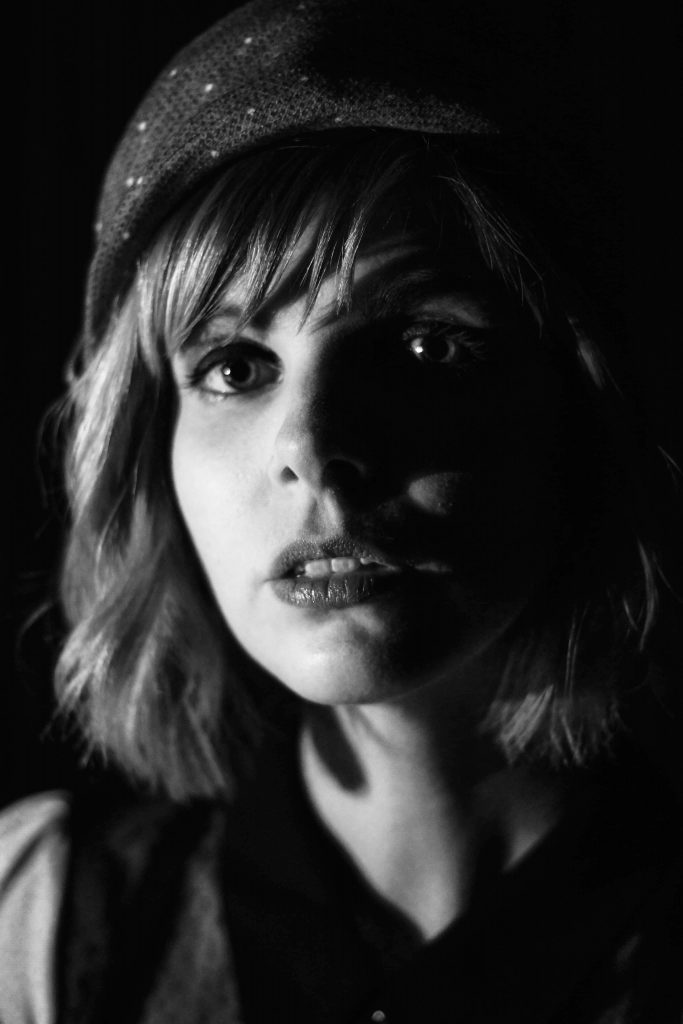
Louis Maistros photographer
You may like
Original Creations
Goodbye for Now, a Short Story by Jennifer Weigel
Published
1 day agoon
March 30, 2025What if ours weren’t the only reality? What if the past paths converged, if those moments that led to our current circumstances got tangled together with their alternates and we found ourselves caught up in the threads?
Marla returned home after the funeral and wake. She drew the key in the lock and opened the door slowly, the looming dread of coming back to an empty house finally sinking in. Everyone else had gone home with their loved ones. They had all said, “goodbye,” and moved along.
Her daughter Misty and son-in-law Joel had caught a flight to Springfield so he could be at work the next day for the big meeting. Her brother Darcy was on his way back to Montreal. Emmett and Ruth were at home next door, probably washing dishes from the big meal they had helped to provide afterward, seeing as their kitchen light was on. Marla remembered there being food but couldn’t recall what exactly as she hadn’t felt like eating. Sandwiches probably… she’d have to thank them later.
Marla had felt supported up until she turned the key in the lock after the services, but then the realization sank deep in her throat like acid reflux, hanging heavy on her heart – everyone else had other lives to return to except for her. She sighed and stepped through the threshold onto the outdated beige linoleum tile and the braided rag rug that stretched across it. She closed the door behind herself and sighed again. She wiped her shoes reflexively on the mat before just kicking them off to land in a haphazard heap in the entryway.
The still silence of the house enveloped her, its oppressive emptiness palpable – she could feel it on her skin, taste it on her tongue. It was bitter. She sighed and walked purposefully to the living room, the large rust-orange sofa waiting to greet her. She flopped into its empty embrace, dropping her purse at her side as she did so.
A familiar, husky voice greeted her from deeper within the large, empty house. “Where have you been?”
Marla looked up and glanced around. Her husband Frank was standing in the doorway to the kitchen, drying a bowl. Marla gasped, her hand shooting to her mouth. Her clutched appendage took on a life of its own, slowly relinquishing itself of her gaping jaw and extending a first finger to point at the specter.
“Frank?” she spoke hesitantly.
“Yeah,” the man replied, holding the now-dry bowl nestled in the faded blue-and-white-checkered kitchen towel in both hands. “Who else would you expect?”
“But you’re dead,” Marla spat, the words falling limply from her mouth of their own accord.
The 66-year old man looked around confusedly and turned to face Marla, his silver hair sparkling in the light from the kitchen, illuminated from behind like a halo. “What are you talking about? I’m just here washing up after lunch. You were gone so I made myself some soup. Where have you been?”
“No, I just got home from your funeral,” Marla spoke quietly. “You are dead. After the boating accident… You drowned. I went along to the hospital – they pronounced you dead on arrival.”
“I don’t know what you’re talking about,” Frank said. “What boating accident?”
“The sailboat… You were going to take me out,” Marla coughed, her brown eyes glossed over with tears.
“We don’t own a sailboat,” Frank said bluntly. “Sure, I’d thought about it – it seems like a cool retirement hobby – but it’s just too expensive. We’ve talked about this, we can’t afford it.”
Marla glanced out the bay window towards the driveway where the small sailboat sat on its trailer, its orange hull reminiscent of the Florida citrus industry, and also of the life jacket Frank should have been wearing when he’d been pulled under. Marla cringed and turned back toward the kitchen. She sighed and spoke again, “But the boat’s out front. The guys at the marina helped to bring it back… after you… drowned.”
Frank had retreated to the kitchen to put away the bowl. Marla followed. She stood in the doorway and studied the man intently. He was unmistakably her husband, there was no denying it even despite her having just witnessed his waxen lifeless body in the coffin at the wake before the burial, though this Frank was a slight bit more overweight than she remembered.
“Well, that’s not possible. Because I’m still here,” Frank grumbled. He turned to face her, his blue eyes edged with worry. “There now, it was probably just a dream. You knew I wanted a boat and your anxiety just formulated the worst-case scenario…”
“See for yourself,” Marla said, her voice lilting with every syllable.
Frank strode into the living room and stared out the bay window. The driveway was vacant save for some bits of Spanish moss strewn over the concrete from the neighboring live oak tree. He turned towards his wife.
“But there’s no boat,” he sighed. “You must have had a bad dream. Did you fall asleep in the car in the garage again?” Concern was written all over his face, deepening every crease and wrinkle. “Is that where you were? The garage?”
Marla glanced again at the boat, plain as day, and turned to face Frank. Her voice grew stubborn. “It’s right here. How can you miss it?” she said, pointing at the orange behemoth.
“Honey, there’s nothing there,” Frank exclaimed, exasperation creeping into his voice.
Marla huffed and strode to the entryway, gathering her shoes from where they waited in their haphazard heap alongside the braided rag run on the worn linoleum floor. She marched out the door as Frank took vigil in its open frame, still staring at her. She stomped out to the boat and slapped her hand on the fiberglass surface with a resounding smack. The boat was warm to the touch, having baked in the Florida sun. She turned back towards the front door.
“See!” she bellowed.
The door stood open, empty. No one was there, watching. Marla sighed again and walked back inside. The vacant house once again enveloped her in its oppressive emptiness. Frank was nowhere to be found.

So I guess it’s goodbye for now. Feel free to check out more of Jennifer Weigel’s work here on Haunted MTL or here on her website.
Today on Nightmarish Nature we’re gonna revisit The Blob and jiggle our way to terror. Why? ‘Cause we’re just jellies – looking at those gelatinous denizens of the deep, as well as some snot-like land-bound monstrosities, and wishing we could ooze on down for some snoozy booze schmoozing action. Or something.
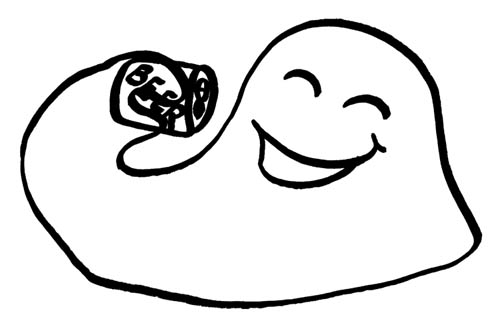
Honestly, I don’t know what exactly it is that jellyfish and slime molds do but whatever it is they do it well, which is why they’re still around despite being among the more ancient organism templates still in common use.
Jellyfish are on the rise.
Yeah, yeah, some species like moon jellies will hang out in huge blooms near the surface feeding, but that’s not what I meant. Jellyfish populations are up. They’re honing in on the open over-fished ocean and making themselves at home. Again.
And, although this makes the sea turtles happy since jellies are a favorite food staple of theirs, not much else is excited about the development. Except for those fish that like to hide out inside of their bells, assuming they don’t accidentally get eaten hanging out in there. But that’s a risk you gotta take when you’re trying to escape predation by surrounding yourself in a bubble of danger that itself wants to eat you. Be eaten or be eaten. Oh, wait…
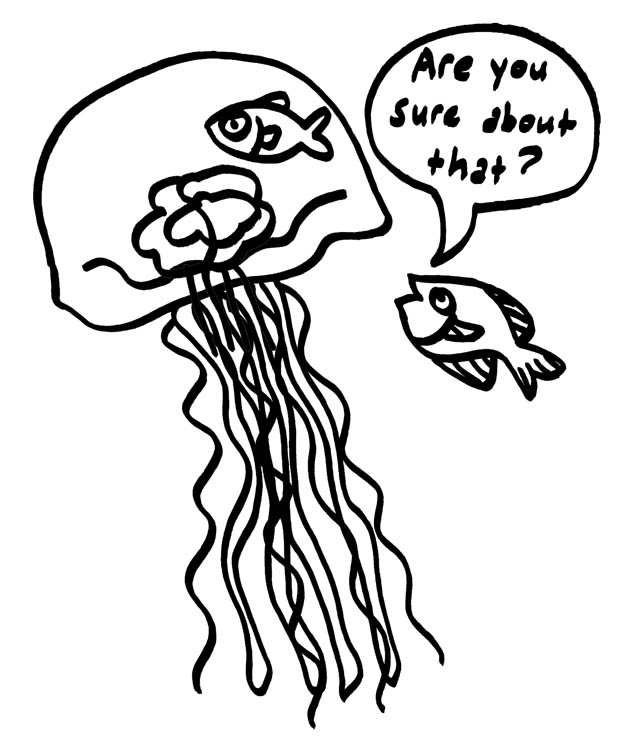
So what makes jellies so scary?
Jellyfish pack some mighty venom. Despite obvious differences in mobility, they are related to anemones and corals. But not the Man o’ War which looks similar but is actually a community of microorganisms that function together as a whole, not one creature. Not that it matters when you’re on the wrong end of a nematocyst, really. Because regardless what it’s attached to, that stings.
Box jellies are among the most venomous creatures in the world and can move of their own accord rather than just drifting about like many smaller jellyfish do. And even if they aren’t deadly, the venom from many jellyfish species will cause blisters and lesions that can take a long time to heal. So even if they do resemble free-floating plastic grocery bags, you’d do best to steer clear. Because those are some dangerous curves.
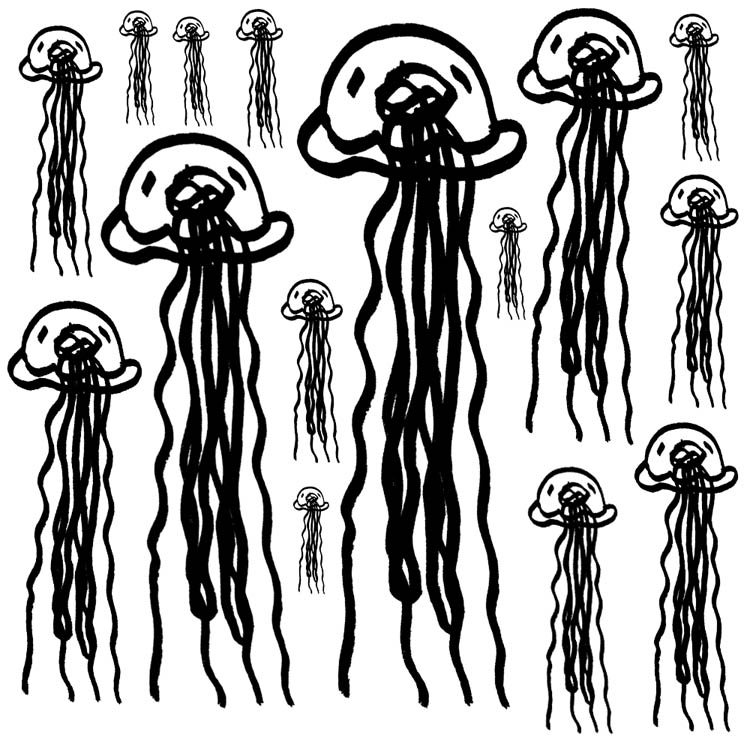
But what does this have to do with slime molds?
Absolutely nothing. I honestly don’t know enough about jellyfish or slime molds to devote the whole of a Nightmarish Nature segment to either, so they had to share. Essentially, this bit is what happened when I decided to toast a bagel before coming up with something to write about and spent a tad too much time in contemplation of my breakfast. I guess we’re lucky I didn’t have any cream cheese or clotted cream…
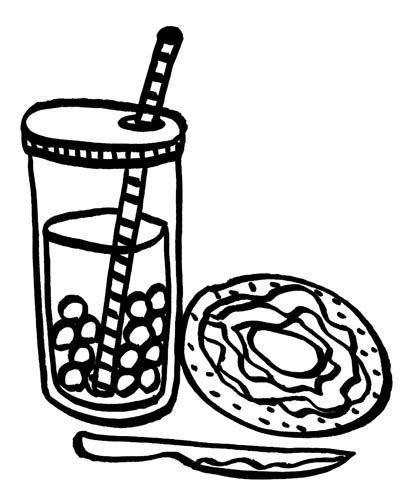
Oh, and also thinking about gelatinous cubes and oozes in the role-playing game sense – because those sort of seem like a weird hybrid between jellies and slime molds, as does The Blob. Any of those amoeba influenced creatures are horrific by their very nature – they don’t even need to be souped up, just ask anyone who’s had dysentery.
And one of the most interesting thing about slime molds is that they can take the shortest path to food even when confronted with very complex barriers. They are maze masterminds and would give the Minotaur more than a run for his money, especially if he had or was food. They have even proven capable of determining the most efficient paths for water lines or railways in metropolitan regions, which is kind of crazy when you really think about it. Check it out in Scientific American here. So, if we assume that this is essentially the model upon which The Blob was built, then it’s kind of a miracle anything got away. And slime molds are coming under closer scrutiny and study as alternative means of creating computer components are being explored.
Jellies are the Wave of the Future.
We are learning that there may be a myriad of uses for jellyfish from foodstuffs to cosmetic products as we rethink how we interact with them. They are even proving useful in cleaning up plastic pollution. I don’t know how I feel about the foodstuff angle for all that they’ve been a part of various recipes for a long time. From what I’ve seen of the jellyfish cookbook recipes, they just don’t look that appealing. But then again I hate boba with a passion, so I’m probably not the best candidate to consider the possibility.
So it seems that jellies are kind of the wave of the future as we find that they can help solve our problems. That’s pretty impressive for some brainless millions of years old critter condiments. Past – present – perpetuity! Who knows what else we’d have found if evolution hadn’t cleaned out the fridge every so often?
Feel free to check out more Nightmarish Nature here.
Original Series
Lucky Lucky Wolfwere Saga Part 4 from Jennifer Weigel
Published
2 weeks agoon
March 17, 2025Continuing our junkyard dawg werewolf story from the previous St. Patrick’s Days… though technically he’s more of a wolfwere but wolfwhatever. Anyway, here are Part 1 from 2022, Part 2 from 2023 and Part 3 from 2024 if you want to catch up.
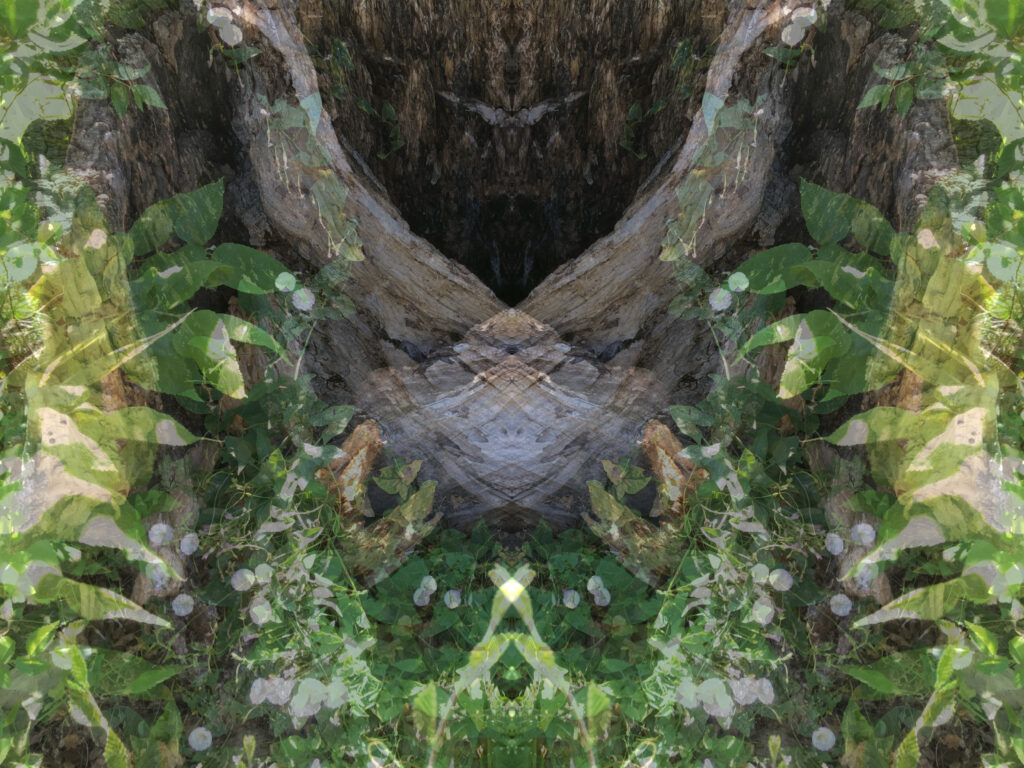
Yeah I don’t know how you managed to find me after all this time. We haven’t been the easiest to track down, Monty and I, and we like it that way. Though actually, you’ve managed to find me every St. Patrick’s Day since 2022 despite me being someplace else every single time. It’s a little disconcerting, like I’m starting to wonder if I was microchipped way back in the day in 2021 when I was out lollygagging around and blacked out behind that taco hut…
Anyway as I’d mentioned before, that Scratchers was a winner. And I’d already moved in with Monty come last St. Patrick’s Day. Hell, he’d already begun the process of cashing in the Scratchers, and what a process that was. It made my head spin, like too many squirrels chirping at you from three different trees at once. We did get the money eventually though.
Since I saw you last, we were kicked out of Monty’s crap apartment and had gone to live with his parents while we sorted things out. Thank goodness that was short-lived; his mother is a nosy one for sure, and Monty didn’t want to let on he was sitting on a gold mine as he knew they’d want a cut even though they had it made already. She did make a mean brisket though, and it sure beat living with Sal. Just sayin.
Anyway, we finally got a better beater car and headed west. I was livin’ the dream. We were seeing the country, driving out along old Route 66, for the most part. At least until our car broke down just outside of Roswell near the mountains and we decided to just shack it up there. (Boy, Monty sure can pick ‘em. It’s like he has radar for bad cars. Calling them lemons would be generous. At least it’s not high maintenance women who won’t toss you table scraps or let you up on the sofa.)
We found ourselves the perfect little cabin in the woods. And it turns out we were in the heart of Bigfoot Country, depending on who you ask. I wouldn’t know, I’ve never seen one. But it seems that Monty was all into all of those supernatural things: aliens, Bigfoot, even werewolves. And finding out his instincts on me were legit only added fuel to that fire. So now he sees himself as some sort of paranormal investigator.
Whatever. I keep telling him this werewolf gig isn’t all that it’s cracked up to be, and it doesn’t work like in the movies. I wasn’t bitten, and I generally don’t bite unless provoked. He says technically I’m a wolfwere, to which I just reply “Where?” and smile. Whatever. It’s the little things I guess. I just wish everything didn’t come out as a bark most of the time, though Monty’s gotten pretty good at interpreting… As long as he doesn’t get the government involved, and considering his take on the government himself that would seem to be a long stretch. We both prefer the down low.
So here we are, still livin’ the dream. There aren’t all that many rabbits out here but it’s quiet and the locals don’t seem to notice me all that much. And Monty can run around and make like he’s gonna have some kind of sighting of Bigfoot or aliens or the like. As long as the pantry’s stocked it’s no hair off my back. Sure, there are scads of tourists, but they can be fun to mess around with, especially at that time of the month if I happen to catch them out and about.
Speaking of tourists, I even ran into that misspent youth from way back in 2021 at the convenience store; I spotted him at the Quickie Mart along the highway here. I guess he and his girlfriend were apparently on walkabout (or car-about) perhaps making their way to California or something. He even bought me another cookie. Small world. But we all knew that already…
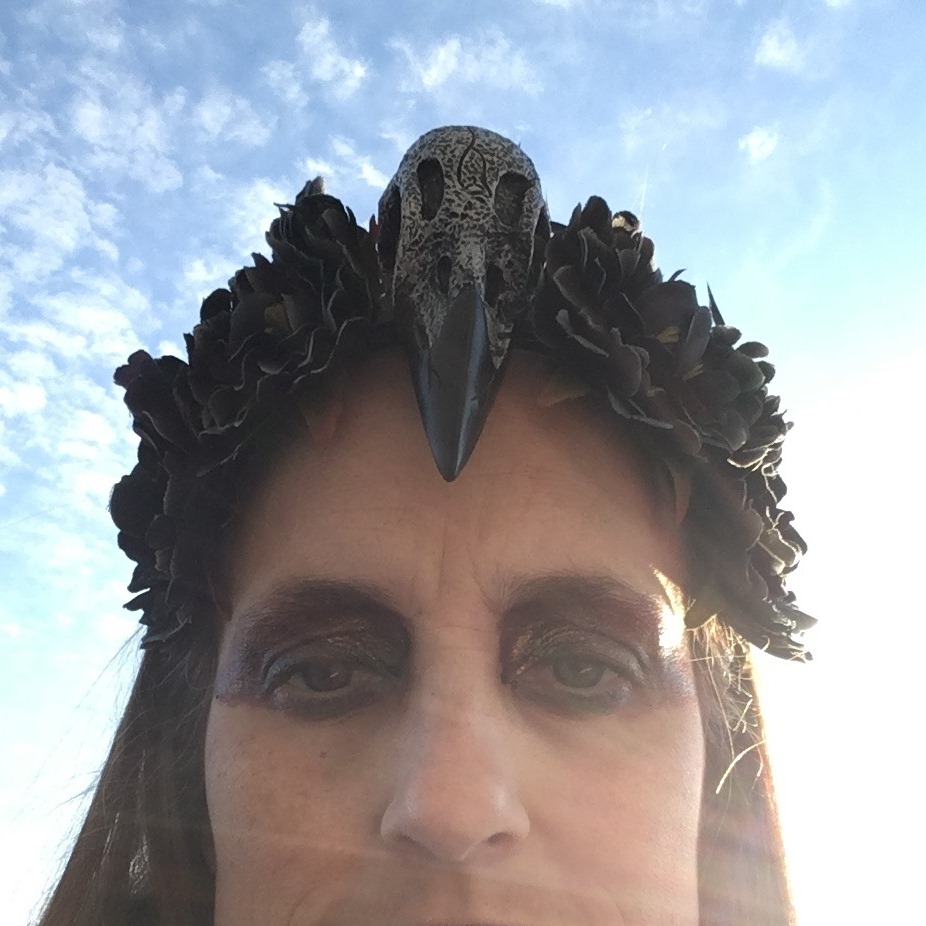
If you enjoyed this werewolf wolfwere wolfwhatever saga, feel free to check out more of Jennifer Weigel’s work here on Haunted MTL or here on her website.


